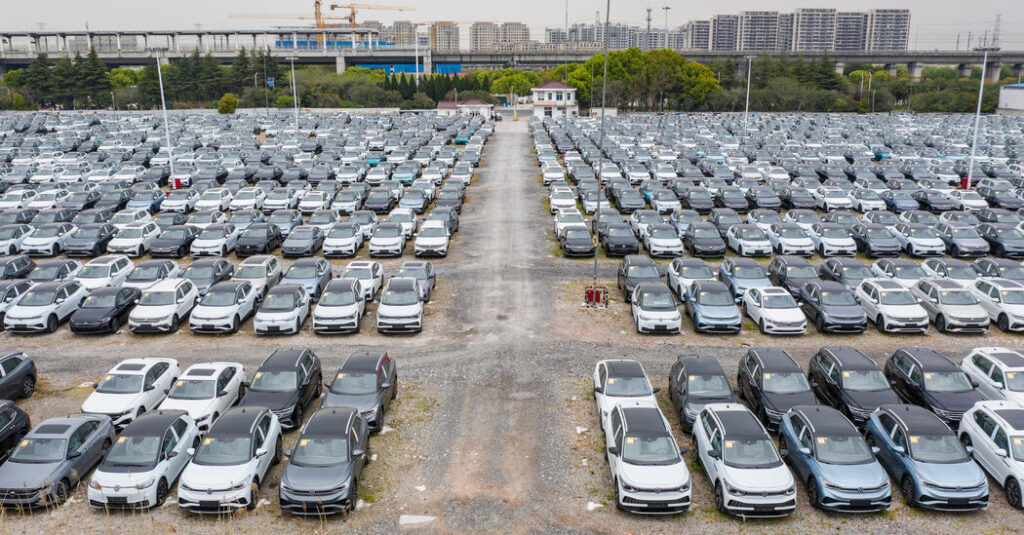Germany Urges Dialogue Amid Escalating China-EU Trade Dispute over Tariffs
By [Author Name]
Beijing – Amid intensifying economic tensions, Germany’s Vice Chancellor and Minister for Economic Affairs and Climate, Robert Habeck, called on Saturday for immediate diplomatic engagements between China and the European Union to address the burgeoning dispute over tariffs. The stakes are notably high, with billions of dollars in trade between the two economic giants hanging in the balance.
Speaking out during his visit to Beijing, Habeck emphasized the urgency for dialogue, expressing optimism that forthcoming talks could avert the imposition of tariffs. However, he cautioned that tariffs might become unavoidable should the European Commission’s concerns over China’s subsidies for its electric vehicle (EV) industry remain unresolved.
Earlier this month, the European Commission proposed imposing tariffs of up to 38 percent on Chinese electric vehicles, atop an existing 10 percent levy on imported cars. These measures respond to findings that China’s EV sector benefits significantly from governmental subsidization and support from state-controlled banks, thus potentially violating World Trade Organization (WTO) rules.
“These tariffs are not punitive,” Mr. Habeck articulated, reiterating that the tariffs are instead designed to countervail subsidies perceived as unfair under WTO statutes.
Chinese officials have vociferously opposed the European tariffs, labeling them as protectionist. In a meeting with Habeck, Chinese Commerce Minister Wang Wentao urged Germany to leverage its influence within the EU to de-escalate the situation, advocating for mutual concessions. Similarly, China’s top economic planning body, the National Development and Reform Commission, contended that the tariffs conflict with global climate change mitigation efforts and vowed to protect Chinese corporate interests.
Germany now finds itself in a precarious position. The rapid growth of China’s EV market is increasingly challenging to Europe’s automotive sector, not least Germany’s. However, German car manufacturers, many of whom have extensive operations in China, worry about potential retaliatory measures from Beijing.
During his Beijing visit, Habeck engaged with several key Chinese economic ministries, deliberately bypassing a meeting with China’s Premier Li Qiang, a significant counterpart. Habeck, who subsequently headed to Shanghai, declined to disclose reasons for not meeting Premier Li. He did, however, critique China’s trade relationship with Russia, highlighting a 40 percent increase last year, a significant portion of which involved dual-use technology beneficial to both civilian and military applications, advocating for an immediate cessation of such trade.
Looking forward, Habeck plans further discussions with German business leaders in Shanghai before visiting Hangzhou, China’s burgeoning tech hub. This comes against the backdrop of WTO rules permitting tariffs to neutralize the distorting effects of subsidies. China, for its part, refutes allegations of improper subsidization, attributing its market leadership in the EV industry to manufacturing efficiency and innovation.
Anticipating potential tariffs, China’s Commerce Ministry has already initiated steps to impose levies on imports of French Cognac and other wine spirits, and proposed tariffs on European pork products. Additionally, there are hints that Beijing may target gasoline-powered vehicles from Europe, potentially impacting German automakers the most.
Historically, German car manufacturers have been instrumental in advancing China’s industrial economy. With longstanding economic ties, German automakers like Volkswagen spearheaded joint ventures in China, navigating the complex tariff landscape. This long-term partnership saw China progressively lower its auto import tariffs post its 2001 WTO accession, and in recent years, amid trade negotiations principally with the U.S. during the Trump administration.
Notably, Germany’s pivotal role was also highlighted during the 2013 solar panel dispute when, under China’s pressure, Germany led efforts to prevent the imposition of EU tariffs, a move that eventually upended the European solar industry. Presently, European advocates for automotive tariffs argue that their industry faces an equivalent peril.
China’s strategy, if it aims to circumvent these tariffs, will focus on persuading a majority of EU nations, representing at least 65 percent of the union’s population, to overturn the Commission’s decision.
Contributing Researchers: Li You and John Liu
Source: [Original Website Link]
